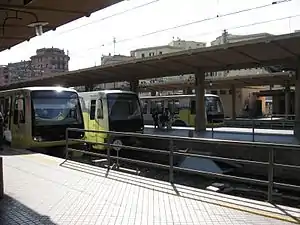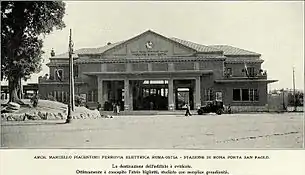Roma Porta San Paolo railway station
Roma Porta San Paolo is the terminal train station of the Rome–Lido railway line in Rome (Italy). The station is connected to the station Piramide of the metro (line B) and to the Roma Ostiense railway station of the Ferrovie dello Stato Italiane. It has six tracks.
Roma Porta San Paolo | |
|---|---|
| Ferrovie regionali del Lazio | |
 A view of the station with three S/300 series trains. | |
| Location | Rome |
| Coordinates | 41.875968°N 12.481767°E |
| Line(s) | Rome-Ostia |
| Tracks | 6 |
| Construction | |
| Structure type | at-grade, terminal station |
| History | |
| Opened | 1924 |
The edifice houses the ticket office and service structures, as well as a news-stand and a coffee shop. It also includes the Porta San Paolo Railway Museum.
History

The building of the station was started, together with the one of the railway, at the beginning of 1919, after the inauguration ceremony of December 30, 1918 in the presence of King Victor Emmanuel III.
The station was designed by Marcello Piacentini. A quite similar one was the Ostia Nuova terminal train station, whose foundation stone was laid on December 10, 1920, also in the presence of the King, and that was destroyed during the war.
The graffiti decorating the interior of the station are works by the Florentine artist Giulio Rosso.
The station and the railway line were inaugurated on August 10, 1924 with a special ride, in which Mussolini – who had become Prime Minister in the meanwhile – took part.
- Via Marmorata (towards Ponte Sublicio and Trastevere)
* Viale Aventino (towards Circus Maximus)
* Via Marco Polo (towards Via Cristoforo Colombo)-EUR and Via Cilicia – Appio-Latino)
* Via Ostiense (towards the Basilica of Saint Paul Outside the Walls)
- ACEA
* Roma Ostiense railway station
* Via Marmorata post office
- Pyramid of Cestius
* Porta San Paolo
* Protestant Cemetery
* Monte Testaccio
* Campo Testaccio
* Centrale Montemartini
* Porta San Paolo Railway Museum
* Santa Maria Liberatrice
* Santa Sabina
* San Saba
Services
The station has available the following services:
 Ticket office
Ticket office Accessibility to disabled persons
Accessibility to disabled persons Coffee shop
Coffee shop News stand
News stand Museum
Museum